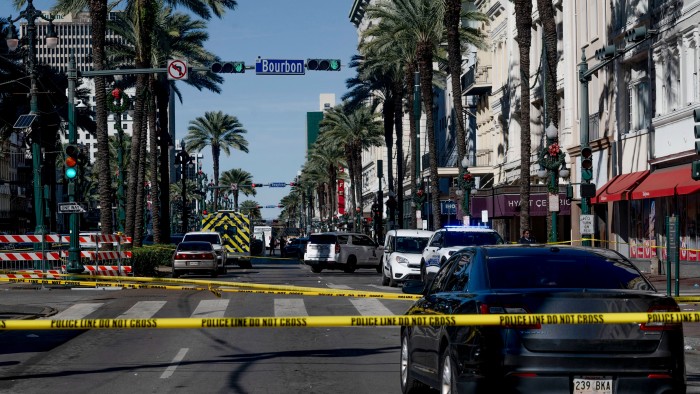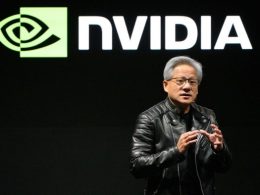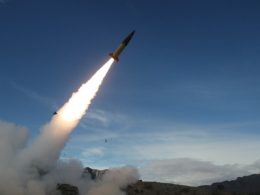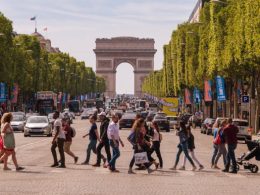Donald Trump’s instinctive reaction to the New Orleans terror attack was to claim it was carried out by an illegal immigrant. Though it was quickly disclosed that the culprit Shamsud-Din Jabbar was Texas-born and bred, the president-elect was persisting with that same line a day later. By then he had added the deep state to the blame sheet. “This is what happens when you have OPEN BORDERS, with weak, ineffective, and virtually nonexistent leadership,” Trump wrote on Truth Social. “The DOJ, FBI, and Democrat state and local prosecutors have not done their job . . . having spent all of their waking hours unlawfully attacking their political opponent, ME, rather than focusing on protecting Americans from the outside and inside violent SCUM.”
Trump helpfully capitalised his two key words; New Orleans was chiefly about “me”; those who oppose me are “scum”. Conspicuously absent from his statement was any sympathy for the 15 murdered New Year’s Eve revellers, an adolescent aspiring nursing student among them. Joe Biden, meanwhile, urged Americans “not to jump to conclusions” though he stressed that Jabbar was flying an Isis-flag on the truck that claimed most of his victims. The outgoing president made the right sympathetic noises for the city of New Orleans and the families of the dead. But I would be surprised if his halting four-minute address drew a big audience. There are still 17 days left before Trump is sworn into office. The psychological transfer of power has long since taken place.
Contra Trump, the Isis angle will probably dominate public debate around the attack. But an Isis-only account would at best be incomplete. Like many lone wolf terrorists, Jabbar, 42, was living a bitter and lonely life that followed two divorces. He had lost primary custody of his children. He was suffering financial distress.
Jabbar’s spiralling circumstances fit a familiar profile of many self-radicalising lone wolves — an isolated male who was angry at the world and trapped in his own private hell. An online terrorist cult seems to have given purpose to Jabbar’s unhappiness and a target for his rage — hedonistic American revellers. Had he been white Christian rather than brown Muslim, he would probably have found his doomsday epiphany in some branch of QAnon or a white supremacist group.
Two weeks before Jabbar’s killing spree, the FBI seized its largest-ever cache of homemade explosives in a Virginia raid. The suspect, Brad Kenneth Spafford, had assembled a small munitions depot on his 20-acre farm, including 150 pipe bombs. He used a picture of Joe Biden for target practice.
A few hours after Jabbar’s New Orleans’ massacre, another US-born army veteran blew himself up in a Tesla Cybertruck outside the Trump hotel in Las Vegas. Much like Spafford, who lost three of his fingers to his own explosives a few years ago, the driver identified in the Cybertruck wreckage was none too bright. The sole victim of Michael Livelsberger’s detonation was himself. The blast did not even extend to Trump hotel windows, which remained intact. Livelsberger was said to be a Trump supporter. Perhaps more significantly his wife had recently kicked him out of the house over claims of infidelity.
The bigger picture, as the University of Chicago’s consistently excellent Robert Pape has chronicled, is that political violence is on the rise in the US. Pape blames its expansion on a number of factors including the growth of far-right conspiracist outfits and radical leftwing groups, such as antifa. In other words, the spread of extremist ideology is behind most of the rise. I would suggest three other drivers — the enabling networks of social media, America’s loneliness epidemic and the country’s flabbergastingly lax gun and munitions laws. If you put all three together, the rising drumbeat of political violence should come as no surprise.
The US is a highly atomised society that lacks many of the financial cushions provided in most other rich democracies to help people who have fallen on hard times. Modern US society also increasingly lacks its once deserved reputation for an ability to sustain humming networks of voluntary associations that gave people a sense of belonging. A large share of America is not just bowling alone, as Robert Putnam said in his 2000 book; they are also radicalising alone. Whatever communities they find are virtual.
What has this to do with 2025? I would love to share my largely derivative theories about US terrorism sprinkled with sapient references to historian Hannah Arendt and novelist Joseph Conrad. But I will spare Swampians. What I do know is that combating the complex and lethal menace of domestic terrorism has to include both federal leadership and the work of highly trained professionals. The goal should be non-partisan; Trump, after all, was almost killed by a lone nut last July, and another got close to making an attempt on him from one of his golf courses.
What I expect will happen is the opposite. On top of Trump’s response to New Orleans, with his undimmed instinct to weaponise any disaster for his own ends (mass deportation springs to mind), consider Trump’s nominees. For the Department of Homeland Security, he has picked Kristi Noem, better known for shooting the family dog and “reassuring” attendees of a National Rifle Associate event that her 2-year-old granddaughter has a shotgun. The outgoing South Dakota governor abolished permits for carrying concealed firearms in the state.
Or consider Kash Patel, Trump’s proposed FBI director, whose priority is a war on Trump’s enemies and taking on the agency itself. Trump has promised to fire the existing head of the Bureau of Alcohol, Tobacco, Firearms and Explosives and is rumoured to be considering Blake Masters, a former Republican Senate candidate in Arizona as its new director. Masters infamously believes in the “great replacement theory” that liberal elites are importing non-white immigrants to capture power and destroy America.
None of these figures can be trusted to act in the public interest. They can be relied on to amplify and act on Trump’s whims. Whatever can be said of Biden’s mixed presidency, I trusted the integrity and public-spiritedness of his key lieutenants — in this context Alejandro Mayorkas at homeland security and Chris Wray at the FBI. That largely invisible security blanket will soon be stripped away, which does not fill me with optimism. I decided this time to leave potential Swamp Notes respondents in peace to enjoy what is left of their holiday. Happy New Year to them and you.
Recommended reading
-
Last month I wrote the Big Read accompanying the FT’s selection of Donald Trump as its person of the year. Contrary to a few rebukes from readers, this is no more an award to Trump than Time Magazine’s choice of Vladimir Putin in 2007, Ayatollah Khomeini in 1979 or Adolf Hitler in 1938 was a vote in their favour. The designation goes to the figure who had the most impact on the world over the past year.
-
My colleague Leo Lewis had an excellent piece on why it’s hard to be a friend of America. Nippon Steel’s likely exclusion from the US market is the rusty nail in the coffin of Biden’s idea of “friendshoring”.
-
Finally, do read Tom Donilon, Obama’s national security adviser, in Foreign Affairs on the foreign policy legacy of the late Jimmy Carter. Donilon got his start at the age of 22 in Carter’s White House. Here, he rightly argues that Carter’s foreign policy legacy was both highly consequential and flushed down the Reagan PR-machine’s memory hole. A couple of days before Carter passed away, I received the galley of my forthcoming biography of Zbigniew Brzezinski Zbig: The life of Zbigniew Brzezinski, America’s Great Power Prophet. Brzezinski was Carter’s disputatious grand strategist.
Your feedback
We’d love to hear from you. You can email the team on swampnotes@ft.com, contact Ed on edward.luce@ft.com and follow him on X at @EdwardGLuce. We may feature an excerpt of your response in the next newsletter
Source link









